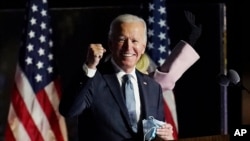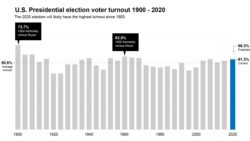Former U.S. Vice President Joe Biden, a fixture in Washington political circles for nearly a half century, has been projected as the winner of the U.S. presidency and stands to be inaugurated on January 20, 2021.
Biden, a Democrat who served 36 years in the U.S. Senate and eight years as second in command to former President Barack Obama, was projected by news organizations to have defeated incumbent Republican President Donald Trump after a bitter campaign and days of post-election ballot counting. The results in each state will not be certified for up to 30 days and are subject to court challenges, but they are expected to stand.
Biden’s victory followed four days of suspense during which officials in a half dozen states tabulated millions of mail-in ballots sent by voters who had wanted to stay away from polling stations for fear of contracting the coronavirus.
A counting update from Pennsylvania on Saturday morning made it clear that Biden would win the state, putting him over the threshold of 270 votes required to win in the 538-vote Electoral College.
Shortly after the Pennsylvania projection was announced, Biden issued a statement calling for national unity.
“With the campaign over, it’s time to put the anger and the harsh rhetoric behind us and come together as a nation," he said. "It’s time for America to unite. And to heal.”
Across the country, Biden supporters exploded with joy at the news, honking car horns in Biden’s home city of Wilmington, Delaware, and pouring into the streets in New York City’s Times Square and mainly Black neighborhood of Harlem. A large crowd of celebrants danced and sang in the street in front of the White House in Washington.
But the Trump campaign immediately issued a statement challenging the projection and insisted it would continue to fight through the courts to reverse the result.
“We all know why Joe Biden is rushing to falsely pose as the winner, and why his media allies are trying so hard to help him: they don’t want the truth to be exposed. The simple fact is this election is far from over,” the statement began.
“Joe Biden has not been certified as the winner of any states, let alone any of the highly contested states headed for mandatory recounts, or states where our campaign has valid and legitimate legal challenges that could determine the ultimate victor,” it said.
On Monday, the statement continued, Trump’s campaign “will start prosecuting our case in court to ensure election laws are fully upheld and the rightful winner is seated.”
Biden’s win makes Trump the third U.S. chief executive in the last four decades to lose re-election after a single four-year tenure as the American leader. Trump himself was on a golf course when the decision was announced.
For eight years, Biden was Obama’s vice president and played a major role in his administration.
In contrast to Trump, a political newcomer when elected in 2016, Biden is an experienced politician, a fact he hammered home on the campaign trail.
First elected to the Senate at age 29, Biden has held elected office for almost 50 years. Assuming current returns will be certified, at 78, he will be the oldest person sworn in as U.S. president.
Biden won the presidency on his third try after failing to win the Democratic Party nomination in both 1988 and 2008, when he garnered little support either year.
Biden was chosen as the Democratic Party candidate after defeating a long list of more liberal presidential contenders. One was the person who will be his vice president, California Senator Kamala Harris.
Now he will take over the U.S. government accompanied by Harris, the first woman in the country’s 244-year history ever elected as either president or vice president. She is the daughter of a Jamaican father and Indian mother and was the first woman of color on a U.S. national political ticket.
Officials do not declare an official winner in their respective states for up to 30 days after the election, but consortiums of major news organizations project a winner in each state when they conclude there are not enough uncounted votes remaining to change the outcome.
This year’s outcome also is subject to recounts in states where the result was very close – usually less than half a percentage point – and a flurry of court challenges from Trump and his Republican Party, who have alleged voting irregularities.
So far, those challenges have been treated skeptically in the courts, and the U.S. Supreme Court – where Republican appointees hold a 6-3 majority – has been reluctant to overrule the states’ election decisions.
This year’s election was extraordinary because of the raging coronavirus, which has so far infected a world-leading 9.7 million Americans and prompted new measures in many states to facilitate early and mail-in voting. It was also impacted by a nationwide wave of protests over the deaths of Black Americans at the hands of white police officers.
Throughout the campaign, Biden hammered at Trump’s handling of the coronavirus, accusing him of “waving a white flag” and refusing to take steps to protect the public. Trump sought to focus the campaign on civil unrest, calling for “law and order” and warning that a Biden victory would lead to runaway violence in the streets.
The pandemic affected the election in another way: Biden encouraged his backers to vote early and by mail in order to avoid spreading the virus, while Trump — who has long insisted the pandemic was waning — urged his followers to vote in person and charged that mail-in-voting was open to fraud.
Because the in-person ballots were quicker to count, Trump leaped to an early lead on Election Night in several critical states. Biden gradually caught up and overtook the president as the mail-in ballots were counted in the following days.
Biden, in contrast to Trump’s “America First” credo in which he withdrew the U.S. from several international treaties, has promised the U.S. will re-engage across the world, rejoining the Paris climate change accord and the pact to restrain Iran from nuclear weapons development.
The U.S. employs an indirect form of democracy, not a national popular vote, to pick its leaders. The outcome is effectively decided in state-by-state elections throughout the 50-state country and the national capital, Washington, D.C. The winner needs 270 or more electoral votes in the 538-member Electoral College.











